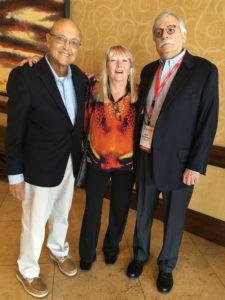Richard ‘Dick’ Jaffre, loving husband, father of two children, and grandfather of four, passed away Aug. 1 at the age of 79. He is survived by his wife, Jean, his children Lisa and Michael, his grandchildren Markus, Benjamin, Johnathan, and Max, and his brother Jim.
Growing up, Jaffre lived abroad with his family in Mexico City, Mexico and Rio de Janeiro, Brazil. He maintained his fluency in Portuguese, routinely made his favorite Brazilian dish feijoada for holiday dinners, and drank his favorite Brazilian cola, Guarana, throughout his life. He also discovered his lifelong passion for golf in Brazil. Jaffre was both a player and a fan, celebrating his retirement with a golfing tour across Scotland with his children that culminated with a round at the Old Course at Saint Andrews.
Jaffre had a long and influential career in the steel and recycling industries. He came into the industry in 1973 with an undergraduate degree in metallurgical engineering from Cornell University and an MBA from the University of Pittsburgh. He started working at Latrobe Steel in Latrobe, Pa., where he met and married his wife, Jean.
In 1974 he joined Midlothian, Texas-based Chaparral Steel, a subsidiary of Texas Industries, where he worked until retiring in 2007. “Dick was a great guy and a legend in the steel and recycling business,” says Lee Dezzutti, vice president, business development at Pittsburgh, Pa.-based AMG Resources Corp. Dezzutti worked with Jaffre for over 10 years.
Jaffre was originally hired to work at Chaparral Steel’s melt shop. But the person who had hired him left the company by the time Jaffre started. On his first day, Jaffre learned that the position was no longer available. “The only position available was being a scrap buyer,” Dezzutti says. “Dick didn’t have experience in the business, so [Chaparral] gave him a trial run. Along the way he invented his own way of buying scrap.”
 When Jaffre began his career, there was a sharp separation between the steel industry and recycling industry. At that time, recyclers didn’t sell their materials directly to steel mills; the business was handled by outside brokers.
When Jaffre began his career, there was a sharp separation between the steel industry and recycling industry. At that time, recyclers didn’t sell their materials directly to steel mills; the business was handled by outside brokers.
Scrap processors were often viewed as a “necessary evil” by steel mills, Dezzutti says, rather than as legitimate suppliers. Jaffre spent his time at Chaparral breaking with those ways of doing business.
He was one of the first steel buyers to purchase materials directly from processors. “Dick believed that mutually beneficial relationships between steel producers and scrap processors was an important part of being a successful steelmaker,” Dezzutti says. “He championed that notion throughout the company and the industry.”
“Dick brought a sense of humanity and understanding to the business,” says Vicki Roche, who worked with Jaffre at Chaparral. Roche retired earlier this year from Gerdau North America. “He was instrumental in making Chaparral leadership understand the value of the scrap processors and that they should be viewed as suppliers.”
Jaffre believed in empowering small scrap dealers, Dezzutti says. Breaking with the business processes of the time, Jaffre would buy from dealers who only produced 2-3 truckloads of material per month. “As far as Dick was concerned, if you could make and deliver recyclable materials that were acceptable at the mill, he would buy them from you directly,” Dezzutti says.
 Under Jaffre, Chaparral was one of the first steel mills that did not blanket cancel orders. “Typically, in those days when the markets did badly or machines broke down, mills would cancel their orders, but not Chaparral,” Roche says. “Dick was always looking for ways to bridge understanding between steel producers and recyclers.” Jaffre ensured that the company kept its scales open 24/7 to make things convenient for processors to deliver their trucks.
Under Jaffre, Chaparral was one of the first steel mills that did not blanket cancel orders. “Typically, in those days when the markets did badly or machines broke down, mills would cancel their orders, but not Chaparral,” Roche says. “Dick was always looking for ways to bridge understanding between steel producers and recyclers.” Jaffre ensured that the company kept its scales open 24/7 to make things convenient for processors to deliver their trucks.
Dezzutti recalls Jaffre would send out information about steel mills and trends in the metals markets to all levels of management. “Even the most low-level managers at Chaparral would be in tune with the markets, the mills, and the importance of recyclables to the success of the company,” Dezzutti says.
Roche recalls Jaffre was instrumental in showing Chaparral leadership the commonalities between the steel and recycling industries. “Safety, for example, is a clear priority for both industries,” she says.
Jaffre was the first steel producer to serve on ISRI’s Board of Directors. In 2004, he received the ISRI Gulf Coast Region’s annual Israel Proler Award for outstanding contribution to the recycling industry. “Dick was a pioneer in many ways; a lot of his philosophies live on today,” Dezzutti says.
A memorial was held Aug. 12, at Sparkman/Hillcrest Funeral Home in Dallas. In lieu of flowers, his family encourages gifts made to the UT Southwestern Circle of Friends.
First Body Photo: Richard Jaffre (far left) attending the 2017 Gulf Coast Chapter Convention when he received the Israel Proler Award. Courtesy of ISRI. Second Photo: (left to right) Richard Jaffre, Vicki Roche, and Bob Melendi at the 2017 ISRI Gulf Coast Chapter Convention. Courtesy of Vicki Roche.










